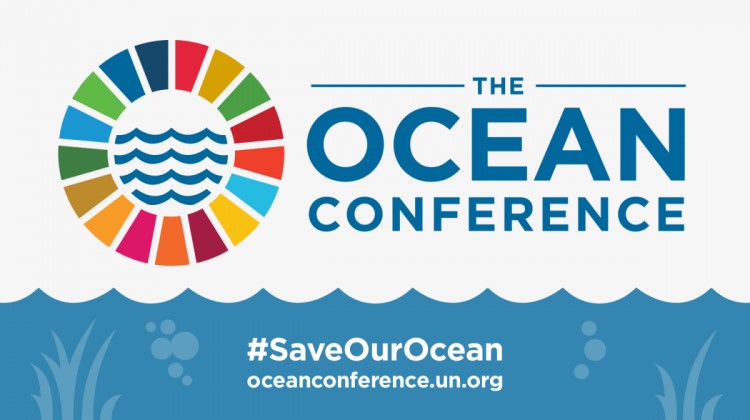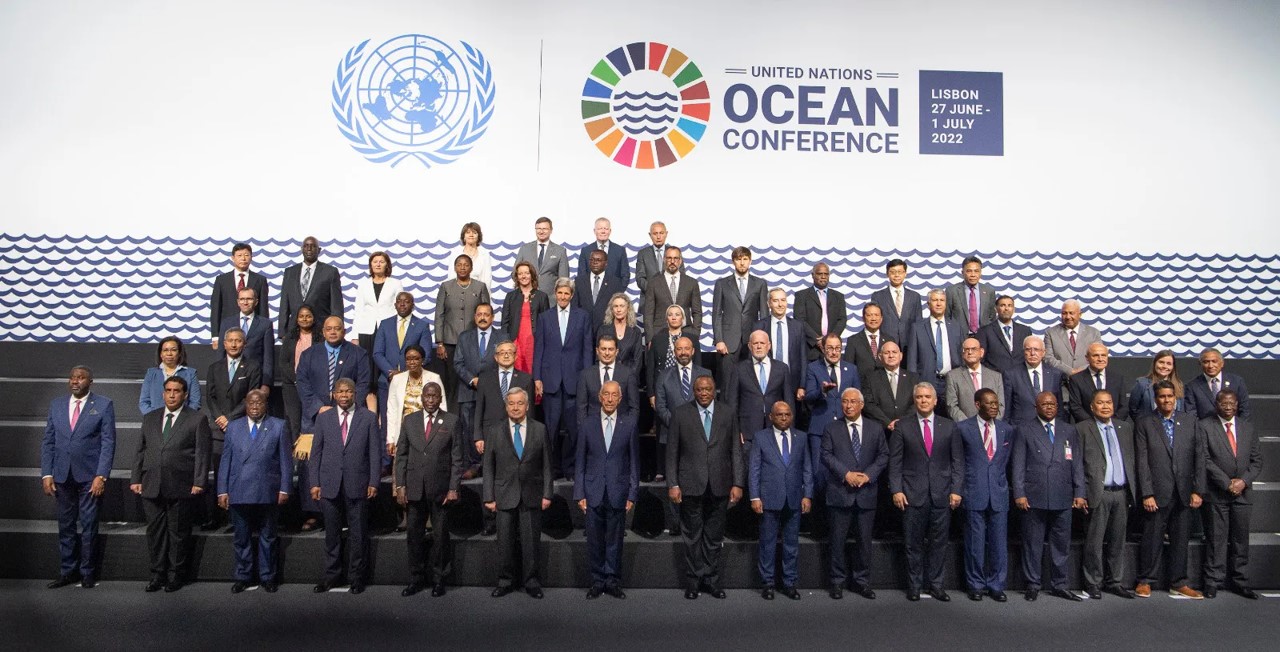2022 United Nations Ocean Conference | Lisbon, 27 June – 1 July 2022

date: 18/07/2022
The Conference, originally scheduled for 2020 but postponed due to the Covid-19 pandemic and co-hosted by the Governments of Kenya and Portugal, had been convened to support the implementation of SDG 14: Conserve and sustainably use the oceans, seas and marine resources for sustainable development. The objective was to consider progress against the background of the challenging issues of our time such as climate change, food insecurity, poverty, human and environmental health, biodiversity loss, and economic inequality.
The conference programme, in addition to the plenary meetings, included interactive dialogues, special sessions and side events.
The eight interactive, multi-stakeholder dialogues were devoted to:
- addressing marine pollution;
- promoting and strengthening sustainable ocean-based economies, in particular for small island developing states and least developed countries;
- managing, protecting, conserving and restoring marine and coastal ecosystems;
- minimizing and addressing ocean acidification, deoxygenation and warming;
- making fisheries sustainable and providing access for small-scale artisanal fishers to marine resources and markets;
- increasing scientific knowledge and developing research capacity and transfer of marine technology;
- enhancing the conservation and sustainable use of oceans and their resources by implementing international law, as reflected in the United Nations Convention on the Law of the Sea; and
- leveraging interlinkages between SDG 14 and other goals towards the implementation of the 2030 Agenda.
Special events included:
- Youth and Innovation Forum
- Localizing Action for the Ocean: Local and Regional Governments
- High-Level Symposium on Water – Bridging SDG 6 and SDG 14
- Sustainable Blue Economy Investment Forum
Announcements of voluntary commitments
During the Conference, delegates announced over 300 voluntary commitments, with approximately 50 high-level commitments and pledges. Voluntary commitments included:
- Portugal’s plan to invest in producing ocean renewable energies with a view to reaching 10 gigawatts of capacity by 2030;
- the Development Bank of Latin America’s commitment of USD 1.2 billion to support ocean projects in the region;
- the European Investment Bank’s commitment to extend an additional EUR 150 million across the Caribbean Region as part of the Clean Oceans Initiative;
- the US, Canada and UK launch of the illegal, unreported and unregulated (IUU) Fishing Action Alliance; and
- Australia’s pledge of USD 1.2 billion to preserve and restore the Great Barrier Reef.
Conference statements on major ocean initiatives
Delegates also reflected on the progress made since the first UN Ocean Conference in 2017 making special reference to concrete steps towards addressing plastic pollution, including in the marine environment, by establishing an intergovernmental negotiating committee to prepare a new international treaty to end plastic pollution. Delegates also measured progress on the new agreement to conserve and sustainably use biodiversity in the high seas, with many hopeful that the process will conclude in 2022. Calls were also made for a moratorium on mining of the deep seabed.
EU positions
Commissioner Sinkevičius emphasized the EU’s commitment to the international ocean and international water agendas; both need to be tightly intertwined in order to achieve timely results in meeting Agenda 2030. The interlinkages between SDG 6 (water and sanitation) and SDG 14 (life below water) were essential, requiring a focus on the water cycle from the source to the sea in an integrated manner.
From the EU’s point of view, important horizontal issues that can be highlighted from the Conference include:
- the need for an integrative approach to Agenda 2030, further interlinking the implementation of SDGs, in particular SDG 6 and SDG 14;
- the need to strengthen the work on source-to-sea approaches and land-based sources of pollution together with developing a global plastics agreement;
- the need for transboundary, cross-sectoral and scientific cooperation; and
- the importance of strengthening governance at all levels, including regional.
High Level Symposium on Water
The Symposium on Water, hosted by the Portuguese minister of environment, had a special focus on the links between SDG 6 on water and SDG 14 on oceans, and on enhancing interactions between fresh water and marine/ocean actions and policies. It has been a milestone event in the run-up to UN 2023 Water Conference.
Commissioner Sinkevičius participated in Roundtable 1 on Synergies between SDG 6 and SDG 14, an integrated vision of the whole hydrological cycle: strengthening cross-sectoral approaches to accelerate implementation of related targets, including financing and governance. He highlighted that the adoption of the resolution for the negotiation of a legally binding international instrument on plastic pollution by UNEA 5.2 was a particularly important milestone in the fight against plastic pollution. Considering that plastic pollution control will have to be tackled on very many different fronts, Integrated Water Resources Management approaches can make important an contribution for that purpose. Outlining EU priorities on transboundary water cooperation, strengthening the Water-ecosystems-food-energy nexus (WEFE), the Commissioner underscored that strengthening water governance at all levels and establishing the position of the UN Water Envoy will be instrumental to advance the global water agenda. The Commissioner concluded that both SDG 6 and SDG 14 need full commitment of the global community and that the current UN Ocean Conference and the next year’s UN 2023 Water Conference are important occasions to deliver outcomes that will make a difference on the ground, and that the EU is committed to do its share.
The symposium included two additional roundtables: one on Water and sanitation services bridging SDG 6 and SDG 14, and one on Existing successful and innovative partnerships to support the implementation of SDG 6 and SDG 14: challenges, opportunities and actions.
Conference outcome

In the Political Declaration adopted at the conclusion of the Conference, the Heads of State and Government and high-level representatives, civil society, and other relevant stakeholders, reaffirm their strong commitment to conserve and sustainably use the ocean, seas and marine resources, and call for greater ambition at all levels to act decisively and urgently to improve health, productivity, sustainable use, and resilience of the ocean and its ecosystem. More specifically, the Declaration, inter alia:
- calls for taking urgent action and to cooperate at the global, regional and subregional levels to achieve all targets of SDG 14 as soon as possible;
- emphasizes the importance of implementing the Paris Agreement and the Glasgow Climate Pact on mitigation, adaptation, and the provision and mobilization of finance, technology transfer, and capacity building to developing countries, including SIDS;
- calls for an ambitious, balanced, practical, effective, robust, and transformative post-2020 global biodiversity framework for adoption at CBD COP 15, noting voluntary commitments by more than 100 Member States to conserve or protect at least 30% of global ocean within MPA effective area-based conservation measures by 2030, emphasizing the need for strong governance and adequate finance for developing countries, in particular SIDS, and recognizing the importance of the UN Decade on Ecosystem Restoration;
- welcomes the UNEA decision to convene an Inter-governmental Negotiating Committee to develop an international legally binding instrument on plastic pollution;
- affirms that conservation and sustainable use of the ocean, advancement of nature-based solutions, and ecosystem-based approaches play a critical role to ensure sustainable, inclusive, and environmentally resilient recovery from COVID-19; and
- affirms the need to reach without delay an ambitious agreement on the international legally binding instrument on biodiversity beyond national jurisdiction.
The Declaration also stresses the importance of integrated ocean management, planning, and decision making; restoring and maintaining fish stocks; preventing, reducing, and controlling marine pollution of all kinds, from both land- and sea-based sources; and developing and implementing measures to mitigate and adapt to climate change, and to avert, minimize and address loss and damage, reducing disaster risk and enhancing resilience, including through increasing the use of renewable energy technologies, especially ocean-based technologies.
The Declaration further commits to establish effective partnerships; explore, develop and promote innovative financing solutions to drive the transformation to sustainable ocean-based economies; and reduce emissions from international maritime transportation, especially shipping, as soon as possible.
More information:
- UN Ocean Conference website
- UN General Assembly resolution 73/292 (2019)
- Political Declaration (Lisbon Declaration)
- IISD Summary Report
- Commission Press Release on International Ocean Governance
- Joint communication on renewed EU agenda on International Ocean Governance (IOG)
- Q&A on International Ocean Governance
